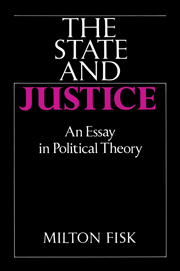Book contents
- Frontmatter
- Contents
- Preface
- Introduction: Can the state rule without justice?
- Part One An outline of a materialist political theory
- Part Two An assessment of the place of justice in the state
- Part Three A functional view of political institutions
- 11 On functional explanation
- 12 Power and function
- 13 Democracy, its bright and its dark sides
- 14 Welfare capitalism
- 15 The new mercantilism
- 16 Organized labor and the state
- Part Four An account of the community of states
- Part Five A reflection on the transition to a new kind of state
- Conclusion: State, class, and democracy
- Notes
- Index
- Frontmatter
- Contents
- Preface
- Introduction: Can the state rule without justice?
- Part One An outline of a materialist political theory
- Part Two An assessment of the place of justice in the state
- Part Three A functional view of political institutions
- 11 On functional explanation
- 12 Power and function
- 13 Democracy, its bright and its dark sides
- 14 Welfare capitalism
- 15 The new mercantilism
- 16 Organized labor and the state
- Part Four An account of the community of states
- Part Five A reflection on the transition to a new kind of state
- Conclusion: State, class, and democracy
- Notes
- Index
Summary
State power conjures up images of riot police, tanks, and missiles. Yet this is only one dimension of state power. For a fuller understanding of state power I shall relate it to state functions. So far I have discussed the economic and legitimating functions of the state. A third function – associated with sovereignty – will be introduced here. State power will then be treated as the ability to exercise these three functions.
PATCO and state power
On August 3, 1981, twelve thousand air traffic controllers walked off their jobs across the United States. A week later ten thousand dismissal notices were in the mail to the strikers. Transportation secretary Drew Lewis had fired the strikers on the ground that it is illegal for federal employees to strike. In due course, the government officially dissolved their union, the Professional Air Traffic Controllers Organization (PATCO). Unions bargaining with the private airlines, whose operations were subsidized by the government through the services of the controllers, did not go out with the controllers in order to help them save their jobs and their union. The public largely bought the argument that legality had to be defended, an argument it forgot when the same administration, two years later, invaded the island of Grenada in violation of international agreements. The defeat of the PATCO strike had a cooling effect on an already demoralized labor movement, thereby making possible lower inflation and higher profits through labor austerity.
- Type
- Chapter
- Information
- The State and JusticeAn Essay in Political Theory, pp. 154 - 165Publisher: Cambridge University PressPrint publication year: 1989



